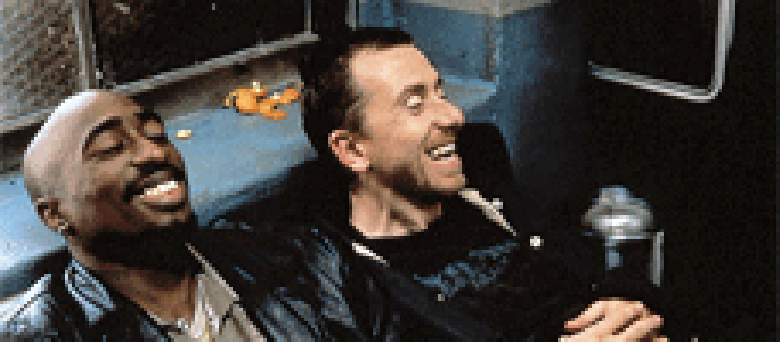Reviews
Vondie Curtis-Hall
USA, 1997
Credits
Review by Victoria Large
Posted on 07 January 2008
Source Universal Studios DVD
January is unique in its potential to be either the most hopeful or most despairing month of the year. Faced with a fresh start, one may be buoyed by the belief that things will change for the better, or be weighted down by the grim realization that they probably won’t. Gridlock’d, the feature-length directorial debut of actor Vondie Curtis-Hall (he also wrote the film and appears in it as an imposing drug dealer), taps into that uncertain January vibe, setting out with a kind of grungy New Year’s determination that escalates into desperation.
It opens with the Cookie, one of a trio of trip-hop musicians, overdosing on heroin on New Year’s Eve and falling into a coma. A television broadcast of the New Year’s celebration in Times Square underscores the scene as her bandmates Stretch and Spoon struggle to revive her, the twee broadcaster’s voice sounding resoundingly out of place. At Cookie’s bedside Stretch and Spoon resolve to kick their dependencies, but their efforts to get clean are met with a bureaucratic resistance so pervasive that it begins to feel cosmic. They discover a maze of forms, lines, and technicalities that affirm the film’s “Life is a traffic jam,” tagline. Yes, this is a movie that used frustration and congestion as a promotional pitch, which may be why it didn’t make particularly impressive waves at the box office ten years ago. As adjectives go, “Kafkaesque” never did make popular movie poster pull-quote material.
It was also somewhat overshadowed by the fact it was released shortly after the international success of Trainspotting vaulted Ewan McGregor and Danny Boyle to the A-list. Similar subject matter inevitably invited critics to compare the two films, but Gridlock’d really has more in common with Gus Van Sant’s 1989 classic Drugstore Cowboy. The final scenes of Trainspotting are ambiguous, but as McGregor’s Renton vows to “choose life,” the fact that he’s charging ahead, grinning wolfishly, suggests that whatever he chooses, he at least has a degree of control. Both Drugstore Cowboy and Gridlock’d however, treat any decision to “choose life” as anticlimax. They leave their (anti)heroes still bleeding, their fates not their own to determine. In Drugstore Cowboy fate and superstition, “the dark forces that lie hidden beneath the surface,” run the show. In Gridlock’d it’s all a bit less mysterious: resolutions or no, the down-and-out are chained to their old lives by endless red tape.
Hall is more intent on criticizing the system than either Boyle or Van Sant, occasionally letting his social conscience run away with him (one scene features an over-the-top tirade by a blind Vietnam vet who has a dog named Nixon), but he has been justifiably praised for keeping his bureaucrats human. As Jennie Yabroff puts it in her review for Salon, they “simply seem tired, overworked and as confused by the system as their clients.” It’s that grounding in humanity that keeps Gridlock’d engaging.
Better still, Gridlock’d brings a stinging, perverse humor to its intentionally maddening, stuck-in-neutral plot. Hall’s script may rage against the machine, but its saving grace is that it also laughs at its absurdities. The best known scene finds one character, in a last ditch effort to get treatment, asking his friend to stab him so he can be admitted to the emergency room. An argument about the locations of the more important internal organs ensues.
The leads, Tim Roth and the late Tupac Shakur, get considerable comedic mileage out of this material, and they share remarkable chemistry. Bleak humor is old hat for Roth, know for scoring laughs while slowly bleeding to death in Reservoir Dogs, and here his clueless but generally well-meaning character Stretch powers much of the film’s comedy. He also acts as the twitchy, artless foil to Shakur, who imbues Gridlock’d with its grieving heart as the pensive and protective Spoon. Knowledge that this was Shakur’s final film can only deepen that sense of grief, but his is a performance that would prove affecting under any circumstances. The genuine bond that Roth and Shakur demonstrate as a duo plays an enormous role in keeping their potentially unsympathetic characters (we are talking about guys who steal their dead friend’s stash and shoot up a few feet away from his body) strangely endearing. In addition, Thandie Newton, all cool charm as Cookie in a number of flashbacks, is winning enough to make you forget how small her role really is, and her character’s precarious state mirrors that of her friends, hovering as they are between the desire to quit and the need for a fix.
As other critics have noted, Hall does stumble a bit with a throwaway subplot involving Spoon and Stretch becoming murder suspects: aside from reinforcing the sense that the two have increasingly few places to turn, it mostly distracts from the central themes rather than enriching them. But he manages to get back on track, and the closing scenes are nicely resonant. “Hell of a way to start the New Year,” Stretch murmurs as a ticking clock grows increasingly loud on the film’s soundtrack, a reminder of how time, patience, and hope can grow short in a purgatorial waiting room where resolving to change isn’t nearly enough.
We don’t do comments anymore, but you may contact us here or find us on Twitter or Facebook.



